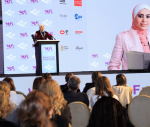You are here
Lebanese demanding total change of state’s political framework
Oct 23,2019 - Last updated at Oct 23,2019
Hundreds of thousands of protesters have taken to the streets and squares across Lebanon to call for the fall of the country's political class, which they accuse of looting the country. They also demand an end to the sectarian model of governance imposed on Lebanon by France, the former colonial power. This gives the presidency to the Maronite Christian community, the premiership to the Sunnis and the post of parliamentary speaker to the Shias, and allocates other offices to figures in the 18 religious communities.
Therefore, when Lebanese call for the fall of the regime, they do not mean ouster of a president, like Egypt's Hosni Mubarak and his entourage, but of the political framework of the state. This is a far more dramatic and transformatory demand than the removal of a set of entrenched politicians and will be much more difficult to achieve. Lebanese politicians have done their utmost to prevent rivals from outside the traditional elite from emerging, and the protesters still do not have a recognised leadership which could take power if a new non-sectarian system is installed.
The crowds gathered on last Friday evening, reconvened on Saturday and swelled on Sunday to celebrate the first victory of people's power, the resignation of four ministers from the right-wing Maronite Christian Lebanese Forces. The portfolios they held are labour, administrative development, deputy prime minister and social affairs. Although their resignations have not been accepted, Prime Minister Saad Hariri sustained a hard blow.
"This is the first domino to fall," one protester said. The threat of withdrawal by this party, headed by Samir Geagea, is a serious development. The Lebanese Forces is the third largest party in parliament and the largest in the bloc headed by Hariri, who was already in a weak position. It had taken him a year to form his current cabinet following his appointment as premier after the May 2018 parliamentary election.
Hariri sustained what may be an existential blow on Monday, when protesters rejected his package of measures intended to foster economic recovery. These include a 50-per cent cut in salaries and pensions of ministers and former ministers and legislators. Banks are expected to provide $3.5 billion to the government while no new taxes will be imposed on struggling Lebanese, 20 per cent of whom live below the poverty line. Hariri's economic plan was not really addressed to them but to donors who pledged to provide Lebanon with $11 billion in grants and soft loans. The people were not impressed and returned to the streets in ever-greater numbers.
The demonstrations, which erupted a week ago were triggered by a Cabinet approval of a tax on calls made on messaging services, particularly WhatsApp. Although a mere $0.20 daily, this tax was, for the Lebanese, as they say, "the straw that broke the camel's back". Since the cabinet adopted an austerity package in July, the taxes that have been imposed target the middle class and the poor. The rich and super-rich have escaped heavy exactions on their incomes and the political elite has kept corrupt gains. Authoritative Al Nahar daily reported that $350 billion has been stashed away in Swiss banks, prompting protesters to demand the return of the money. Some call for draconian measures like those adopted by Saudi Crown Prince Muhammad Bin Salman: Lock up the politicians until they repatriate millions of dollars banked abroad or empty local accounts of corrupt gains.
Corruption and mismanagement have peaked in Lebanon, which has not recovered economically or rebuilt its infrastructure since the end of the 1975-1990 civil war. Due to the government's failure to construct adequate electricity plants, Lebanese have to pay for a certain number of hours daily, supplied by the state and expensive power provided by private operators. The same is true of water. With the aim of keeping dollars in Lebanon, banks offer an 8-per cent interest rate on dollars. Higher interest is paid on Lebanese Liras. Instead of investing in industry or services, Lebanese put their money in banks and keep it there. Consequently, investment and consumption have fallen. The economy has stalled. The public debt is nearly 150 per cent of GNP. International donors have conditioned funding on implementation of economic reforms and curbing corruption. If this is to be achieved, there must be a mechanism established to monitor the dispersal of funds and provide transparency so that people know how they are spent. Otherwise, money will disappear and popular demands will not be met.
Although the government has announced the withdrawal of the WhatsApp tax, this action has not satisfied the populace, as the exaction was just one of many designed to soak the middle class and the poor. They face high rents, rising prices for food and fuel and steep school and university fees. The rich remain rich because they have the resources to meet or dodge tax demands or to leave the country. Furthermore, the populace does not trust the political elite to use funds gathered through taxation to improve the situation. Trust has gone. Bitter frustration remains. The ongoing protests are far more serious than those of 2015, when a refuse collection crisis launched mass anti-government demonstrations. These protests served as a warning to the politicians, which they ignored, at their peril. Now they face some 1.3 million angry Lebanese, one-quarter of the population, demanding total change.













